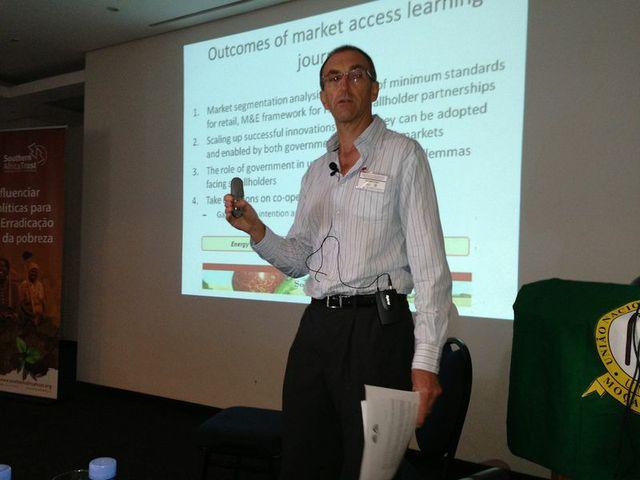The Southern Africa Trust (SAT) roots for improved rural agricultural financing
The Southern Africa Trust (SAT) roots for improved rural agricultural financing

01/06/2013
Maputo – The smallholder farmer in Africa is in dire need of alternative source of financing as the traditional platforms are not working properly to liberate the famer. According to Elizabeth Mprofu, the East and Southern Africa Small Scale Farmers Forum (ESAFF) Vice Chairperson, to turn scale farmers into businessmen and business women, seeking alternative source sources of financing such as savings clubs is necessary, even as farmers networks develop capacities for policy engagement and takes advantage of the space for civil society within the SADC secretariat.
Ms. Mpofu made the assertion while addressing a Regional Forum on Rural Agricultural Financing and Market Access held from 29-30 May 2013, which co-organized by ESAFF.
The other organizers were: National Farmers Union of Mozambique (UNAC), the Southern Africa Trust (SAT), and The Ford Foundation at Hotel Cardoso, Maputo, Mozambique.
According to the forum financing rural agriculture is an important asset for sustainable food security in Africa; it provides an opportunity for smallholder farmers to access reliable financing for agricultural production. The forum noted that available financing is inadequate to meet the demands by smallholder farmers who in actual fact are the major producers of food. There are so many reasons for this trend such as reluctance by governments to meet their Maputo Declaration of allocating 10% of their budgets to agriculture with some countries having less that 3% allocated to agriculture, lack of rural small scale enterprises and reluctance by financial institutions to support small scale farmers because small scale farmers lack collateral security.
The objective of Regional Forum on Rural Agricultural Financing and Market Access was to facilitate an in depth discussion among smallholder farmers and other stakeholders on the critical issues affecting agriculture production particularly rural agriculture finance and product market access. The forum was attended by 35 participants drawn from ESA countries composed small scale farmers, farmer groups, funding partners, NGOs, government ministries from various regional countries, research institutions and media. The deliberations were rich in real practical issues and case studies from the various countries and projects that various NGOs, farmer organizations, research institutions and governments are implementing in the region. ESAFF was represented by Ms Elizabeth Mprofu, the ESAFF Vice Chairperson and Mr Richard Mambeva, ESAFF Campaigns, Lobby and Advocacy Programme Officer.
The forum came as a follow up to a meeting organized in October 2012, by SAT, Zambia National Farmers Union (ZNFU) and Institute for Democracy in Africa (IDASA) on food security policy dialogue in Lusaka, Zambia. The dialogue had discussions focusing on the role of smallholder farmers to contribute to food security in the region. The forum provided platform to SSFs and farmers organizations as well as other stakeholders for further discussing the importance of rural agricultural financing and Market access and an opportunity for farmers and other development practitioners to have in-depth discussion on the opportunities and challenges related to access rural financing and market access.
Ms. Mpofu expressed gratitude to SAT for linking ESAFF with the SADC Secretariat and ensuring that ESAFF is going to have dialogue with the regional body and also ensuring that ESAFF voice was heard in the new SADC Regional Agricultural policy. “Without SAT’s efforts and support our initiatives of seeking space in policy making cycles would have been difficult,” she added. She went on further to add that the voice of farmers has been inserted in the recently drafted SADC Regional Agricultural Policy for access to agricultural assets for improved agricultural production, increased participation in output markets, gender mainstreaming of national and regional agricultural policy and access to agriculture finance for increased agricultural production’’.
She called on the SADC governments to ensure that small scale farmers are adequately represented in the regional, policy making space and that farmers proposals should be put into practice as the SSFs contribute 70% of the SADC population with more than 75% of agriculture being undertaken by the same SSFs. As small scale farmers we have been advocating for increased financial resources for an increased agricultural production and improved markets and infrastructural development to meet needs of small scale farmers, she added.
The discussions on New ICT technologies for improved access to market information and the role of market information system in the food security agenda benefited small holder farmers and gave them better information on how they can utilize ICTs and market information systems to access up to date information on markets.
Mrs Mpofu emphasized that commitments on Maputo Declaration and the new SADC RAP initiative by governments should be made real. From the forum, ESAFF was reassured that farmer organizations play a crucial role in chasing the low returns and bulking them up for the market (i.e. credit providers, produce markets). In order to do this, farmer organizations (FOs) require capacity so that members can reach optimal production levels and it is important for FOs to establish linkages with services providers such as were represented in the meeting. It was noted that development partners, regional farmer organizations and national FOs play an important role in establishing such relationships. And finally FOs should be proactive in lobbying government to address the various problems affecting farmers (such as access to finance and markets). FOs should aggregate small and large scale farmers and act as an intermediary for services such as the provision of credit facilities.
Regional FOs with the assistance of organizations such as the ESAFF and SACAU must be academies that national FOs can use to build their capacities, create financial institutions to fund smallholder farmers and must monitor the implementation of signed international, continental and regional agreements (e,g Millennium Development Goals and the Comprehensive Africa Agriculture Development Programme).






















